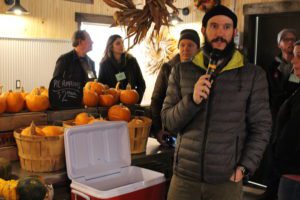Jan 27, 2023Storytelling can end commodity farming
John Stanley believes the agriculture community must reveal itself to the marketplace in order to enhance its standing and make farms profitable.
Stanley, a horticultural consultant based in Nanup, Australia, told attendees at his keynote address during the recent Great Lakes Fruit, Vegetable & Farm Market EXPO in Grand Rapids, Michigan, that it’s time to “Get Naked.”


“We’ve tended to hide ourselves from the consumer, overall, as an industry. We have to become the heroes,” he said.
Stanley and his wife own Chestnut Brae – a 1,000-tree sweet chestnut farm. They focus on learning more about their key consumers and how to market to them, while delivering the ultimate farm experience.
“Nine years ago, we started the largest chestnut farm in West Australia,” he said. “We pursued the chestnut-fed pork market. Other chestnut products contribute to the added-value industry. We won an award for best innovators in agriculture in western Australia.
“We’re the only producer of chestnut flour and chestnut ale, which won an award for the best ale in the world in 2016 and again in 2022 at $29 a bottle. People always say to us, ‘that’s expensive,’ as they buy six (bottles).
“We believe in being price makers rather than price takers. As an industry, globally, we’re not that good at being price makers. We have to be good as price takers. It’s time for us to change that make-up.”
Post-pandemic, farm marketers have had to adapt to new techniques in their businesses.
“Challenging times means challenging questions,” he said. “How are we going to challenge how we are going to grow our industry and our businesses as we move forward?”
Farm marketers are not product sellers; they are story sellers, he said.
“We should be telling everybody the history of the farm, the produce that we grow on the farm, the people involved in growing that product on the farm, and the rollercoaster we’ve been on enduring the downs and the ups,” Stanley said.


“If you’re not a storyteller, you tend to become a commodity seller. Storytelling doesn’t cost us anything but it can make a big difference to the bottom line.”
Stanley suggested farm marketers put their picture on product labels.
“Put a face to the product. People want to deal with people,” he said. “We are at the core. People believe our values.”
Farm operators must decide whether to be a commodity farmer or a boutique farmer. Commodity operations are large-scale factory farming, while boutique represents a small farm.
“Don’t get stuck in the middle,” Stanley said. “You will get squeezed out of the market because you haven’t defined your future.”
One of the benefits of COVID-19 challenges for all agriculturalists is that “we’ve been able to get outside the box and see what’s happening. We’re seeing about 16% growth a year in farm markets, which is quite a relief. During COVID, we were seeing about 40% growth. It’s good to get down to manageable proportions again.”
The industry is reimagining farming methods, Stanley said.
“We had the mechanical revolution and the genetic revolution in our industry. The digital revolution is next,” he said. “Now we have to understand robotics, drones, self-driving tractors and precision farming – that includes elements such as plant growth sensors and soil moisture sensors. For a lot of us, we’ve got to learn new skills.”
Urban farms, reduced food miles, vertical-layered farming and environmental awareness will move to the forefront, Stanley said.
“We’re seeing this huge change after the digital revolution that we need to be addressing, looking at and questioning. We need to ask ourselves where we are going to fit in that space.”
Stanley said “there’s room for tradition and innovation. As it keeps growing one way, Chestnut Brae will keep growing another way because there’s a huge opportunity for innovation based on tradition.
“But we have to sell the story,” he said. “Those are the huge opportunities in farming. We have a huge opportunity because the future industry, one of them, has to be horticulture and farming. It will be completely different. It will be scary for some of us, but what an opportunity we’ve got, as long as we say, ‘it’s time to ‘get naked’ and reveal ourselves in the marketplace to our consumer,’ and change the world.”
— Gary Pullano, FGN Senior Correspondent














